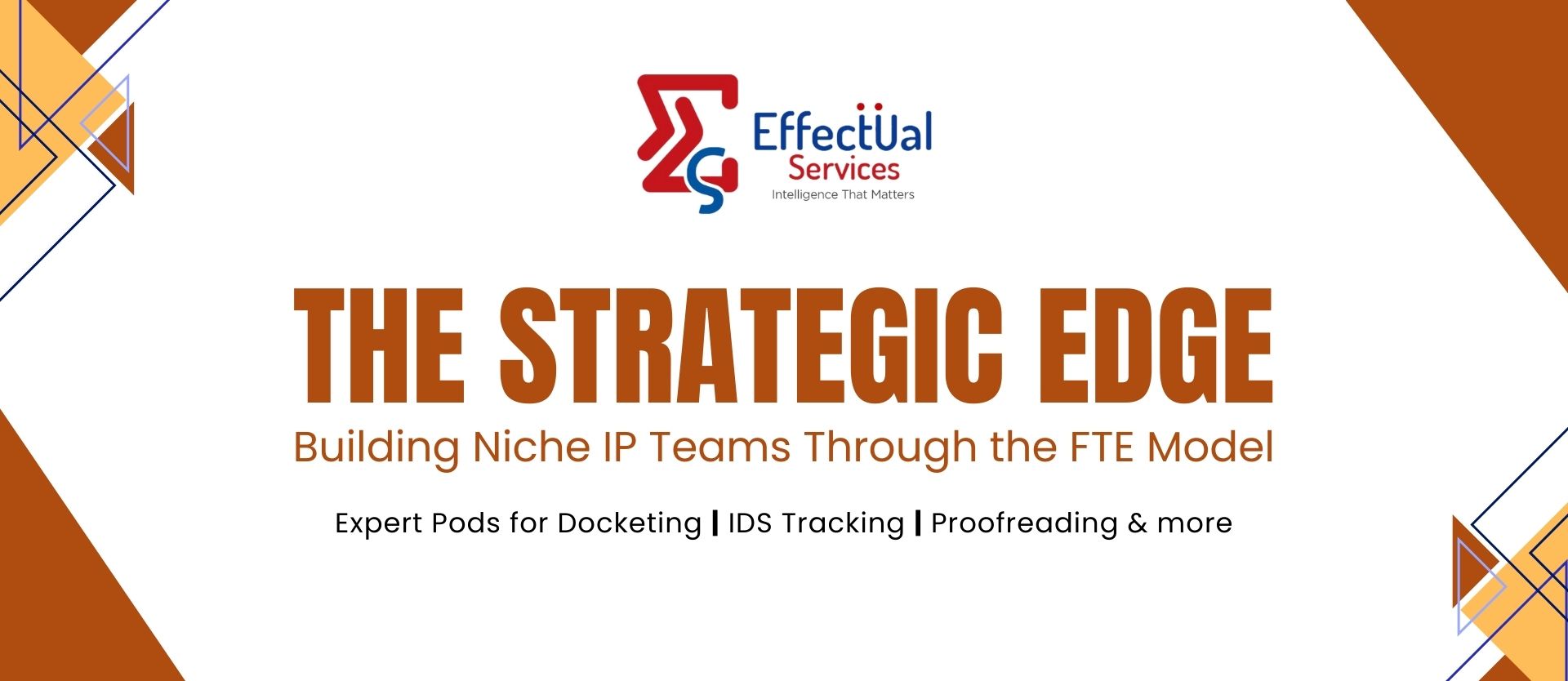The Strategic Edge: Building Niche IP Teams Through the FTE Model

Creating Expert Pods for Docketing, IDS Tracking, Proofreading, and More
In an increasingly complex and fast-paced intellectual property (IP) landscape, growing pressure is being experienced by law firms and corporate legal departments to ensure the simultaneous delivery of quality, speed, and cost-efficiency. This multidimensional demand is often not being effectively met by traditional models of legal delivery, especially with respect to the high-volume, process-driven aspects of IP operations such as docketing, Information Disclosure Statement (IDS) tracking, proofreading, data verification, and more.
To bridge this gap, a transformative strategy is increasingly being embraced: the formation of niche IP teams through the Full-Time Equivalent (FTE) model is being undertaken by IP leaders.
Dedicated "expert pods" focused on specific functions are being formed and staffed by offshore professionals, through which operational efficiency is being achieved and strategic advantages for long-term success are being unlocked.
In this article, the mechanics, advantages, and implementation of niche IP teams through the FTE model are examined, and the ways in which consistency, scalability, and control are enhanced while costs are optimized are explored.
Why Traditional Models Fall Short
IP management is not solely well-defined by legal expertise; as an alternative, it is also measured by the need for operating excellence. Routine but precarious tasks such as docketing, IDS tracking, and document proofreading are essential to be supported out with high precision, structured workflows, and constant vigilance. In traditional setups:
- These tasks are commonly commenced by generalist paralegals or legal assistants.
- Errors or delays are often generated by workload points.
- Institutional memory and specialty are rarely cultivated.
- The hiring and training of new resources are generally regarded as both costly and time-intensive.
The FTE Model Is Introduced: A Structural Shift
Under the FTE model, full-time offshore professionals are engaged and dedicated exclusively to the client’s IP processes, with work being carried out as virtual extensions of the in-house team. Unlike traditional project-based outsourcing, continuity, accountability, and a deep accumulation of knowledge over time are provided by the FTE model.
What distinguishes this model is the ability it offers for specialized pods to be formed—mini teams within the broader offshore structure that are focused solely on specific IP functions. These niche pods are tailored to exacting client requirements, with training being customized, quality benchmarks being defined, and reporting frameworks being established accordingly.
1. Docketing Pods: Deadlines Are Being Secured
Docketing errors are constantly ranked amongst the top causes of mismanagement claims in IP law. To diminish such risks, teams have been completely allocated to docketing responsibilities. As a consequence:
- Day-to-day docket clarifies are being supported out across jurisdictions.
- Deadline correctness is being ensured through double-layered checks.
- Custom workflow mapping is being implemented in harmony with internal SOPs.
- Jurisdiction-specific rules (USPTO, EPO, JPO, etc.) are being followed rigorously.
Typically, offshore docketing pods are included of 2–4 trained professionals, with oversight and coordination being handled by the client’s docketing manager. To defend 24-hour coverage where required, cross-training and coinciding shifts are being exploited.
2. IDS Tracking Pods: Compliance Is Being Permitted
As global patenting policies grow increasingly multifarious, the management of IDS is being renowned as a critical component of compliance. Dedicated pods are being tasked with the following functions:
- The monitoring of references
- The construction of citation maps
- The preparation of ready-to-file IDS packages using customized checklists
Through the assignment of these administrative responsibilities, the burden associated with IDS management is being compact, and the jeopardies of incomplete disclosures and delayed filings are being significantly minimized.
3. Proofreading & Document Verification Pods: Accuracy Is Being Ensured
The proofreading of patent documents particularly in post-allowance or pre-publication phases—is being acknowledged as a labor-intensive yet essential function. For this purpose, dedicated proofreading pods are being established to:
- Conduct comparisons of pre- and post-issue documents
- Verify bibliographic and claims data for consistency
- Confirm the accuracy of legal citations and references
- Align formatting according to USPTO and EP standards
These pods are being operated within a peer-review framework, under which outputs are being cross-validated by multiple team members. Quality benchmarks are being embedded into workflows, and ongoing audits and client-side sampling are being conducted regularly.
4. Data Management Pods: Accuracy and Audit Readiness Are Being Enhanced
Multiple tools are being used by clients, making data consistency across platforms essential. Data-focused pods are being deployed to manage:
- The real-time entry of prosecution events
- Data clean-up and migration initiatives
- The extraction of reports and analytics
- The creation of dashboards for portfolio visibility
A consistent team that is well-versed in client-specific systems and data requirements is being relied upon to reduce integration errors and enhance reliability.
5. Client Communication & Liaison Pods: Interaction Is Being Supported
Although encountered less frequently, client interaction is increasingly being supported within certain FTE arrangements. Offshore personnel are being engaged to:
- Have docketing calendar reviews scheduled
- Ensure coordination with inventors for the collection of signatures
- Have follow-up communications related to due diligence documentation sent
With appropriate training and communication protocols being established, even external-facing responsibilities are being effectively managed offshore—typically under close supervision.
Benefits of Expert IP Pods
1. Deep Specialization
Higher quality output is achieved through the use of focused pods. Team members are specifically trained in their respective task areas, resulting in:
- Increased speed and accuracy
- Improved issue identification
- Reduced escalations and rework
In contrast to generalist models, deep institutional memory and domain fluency are developed within niche pods.
2. Scalability with Control
Vertical scaling is achieved by having additional experts added to the same function, while horizontal scaling is enabled through the establishment of new pods for distinct functions. Through this approach, flexibility is preserved without allowing process fidelity to be compromised.
3. Cost Optimization
Important cost savings ranging from 40% to 70% are typically achieved through the use of offshore FTEs, with quality standards being constantly maintained.
4. Embedded Oversight & SLA-Driven Delivery
Improvement time, quality scores, and communication protocols are administered by service level agreements (SLAs), under which pods are operated with strict discipline. Review beats are often recognized on a weekly or monthly basis by clients to ensure clearness and accountability.
5. Seamless Integration into the Client Ecosystem
Whether docketing software, association platforms such as Teams or Slack, or internal knowledge bases are used, seamless integration is ensured, as expert pods are positioned as allowances of the client’s operational ecosystem.
Overcoming Common Challenges
1. Resistance from Internal Teams
Internal teams may fear job loss or concentrated control. Address this through transparent communication: offshore pods expand, not replace, internal teams acquittal them to focus on strategy and client recommended.
2. Quality Concerns
With the right training, checklists, and audits, offshore pods can counterpart or surpass in-house performance. Some firms even implement “blind QA” where randomly selected outputs are measured independently.
3. Security Risks
Leading vendors hire military-grade data protection, secure VPNs, access-controlled environments, and periodic audits. Data localization requirements are also honoured as per client policies.
Case Study Snapshot: US Patent Boutique with 50% Cost Reduction
A 20-attorney IP firm in the US partnered with an India-based vendor to create the following FTE pods:
- 3-member docketing team
- 2-member IDS & prior art tracking team
- 1 document proofreader
Over 12 months:
- TAT improved by 60%
- Internal docketing workload reduced by 75%
- Annual cost savings: $180,000+
- Zero docketing-related client complaints
By year two, the firm added a paralegal pod for inventor declarations and forms management, continuing the momentum.
The Future: Building Cross-Functional Super Pods
As maturity grows, some IP departments evolve into cross-functional pods combining docketing, IDS, proofreading, and even billing review under a unified offshore team. With shared knowledge bases and SOPs, these “super pods” enable even greater agility and collaboration.
Technology also plays a pivotal role. Many FTE pods now interface with automation tools, IPMS APIs, and AI-assisted proofreading solutions creating a hybrid human + tech model that sets new benchmarks in IP operations.
Conclusion
The FTE model is no longer just about reducing costs it is a strategic lever for building capability, resilience, and excellence in IP operations. By creating niche pods dedicated to specific IP functions, organizations gain the precision of specialization with the flexibility of scalability.
In an era where operational excellence is as critical as legal strategy, building niche IP teams through the FTE model offers a clear competitive edge turning back-office processes into front-line enablers of innovation, speed, and client satisfaction.
As more IP departments reimagine their delivery models, those who invest early in expert pods will be best positioned to lead the next chapter of legal innovation.
Related Resource: Challenges and Benefits of Offshore FTE Support in IP
Solutions Driving Innovation & Intelligence
Enabling Fortune 500's, R&D Giants, Law firms, Universities, Research institutes & SME's Around The Globe Gather Intelligence That
Protects and Nurtures Innovation Through a Team of 250+ Techno Legal Professionals.

